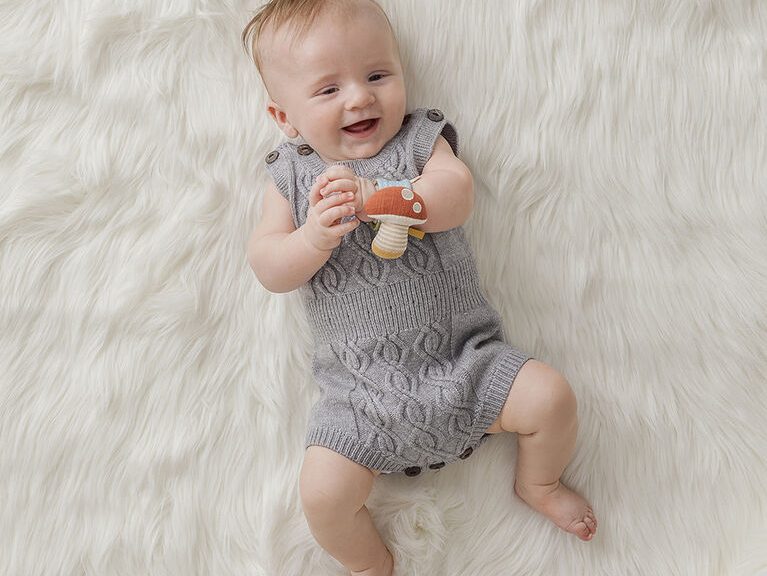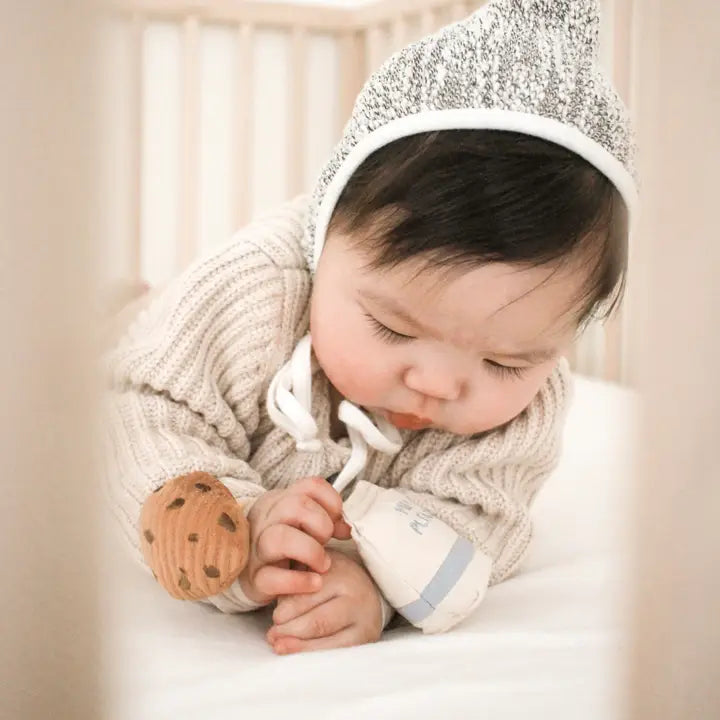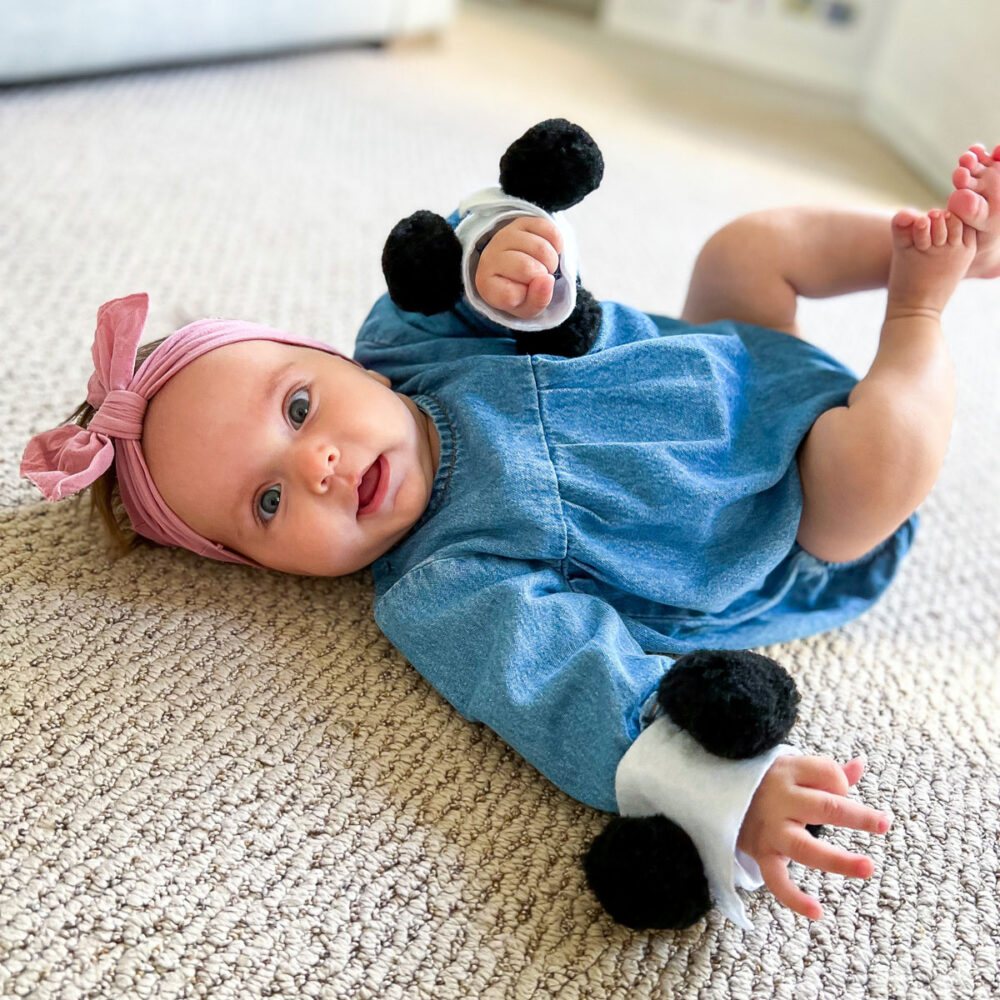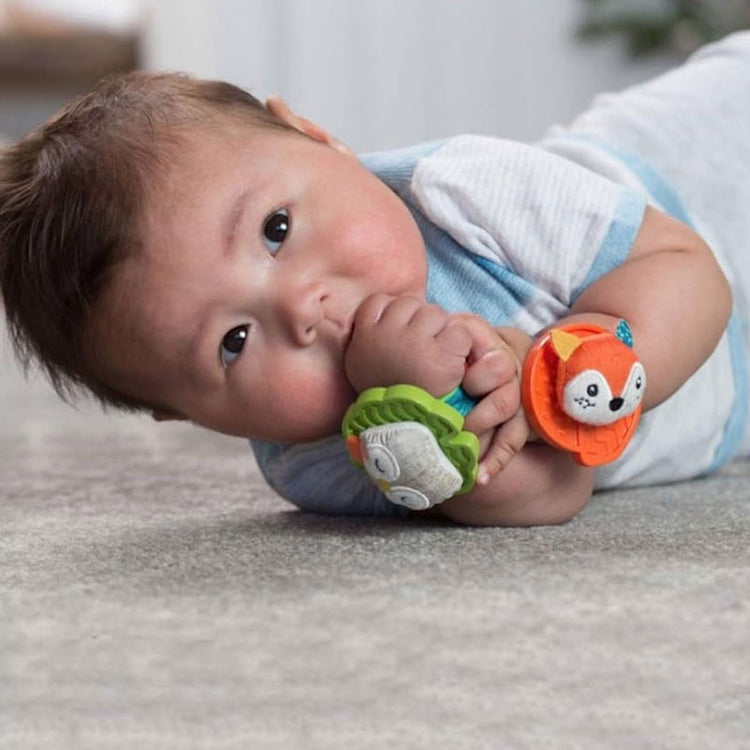The Benefits of Baby Wrist Rattles for Your Infant’s Development
Baby wrist rattles offer myriad developmental advantages. Firstly, they encourage the discovery of hand-eye coordination. As infants reach and grab, their visual tracking improves. This simple action of rattling also supports cognitive development. Babies learn cause and effect through the sounds produced. Moreover, sensory stimulation abounds as rattles often feature varied textures. These textures prompt touch response refinement, an essential aspect of sensory learning.
The auditory input from a wrist rattle’s gentle sound supports auditory development too. Compared to louder toys, the soft jingle of baby wrist rattles is comfortable for delicate infant ears. This can enhance sound recognition abilities over time. Additionally, the visual appeal of bright colors and patterns on these rattles captures an infant’s attention. This visual stimulation can be critical for visual cognitive development.
The social aspect is another key benefit. Baby wrist rattles invite interaction. Parents shaking the rattle can lead to moments of shared joy and communication. This early interaction plays a vital role in social and emotional development. Lastly, baby wrist rattles are fantastic for promoting voluntary movements. As babies attempt to recreate the sounds, they improve their motor skills. Their small, intentional movements aid muscle development and control.
In summary, baby wrist rattles are more than just toys. They are developmental tools that can greatly assist in your infant’s growth. From motor skills to cognitive awareness, these enchanting toys aid in creating a rich sensory environment for your baby to explore and enjoy.
Top Features to Look for in Quality Baby Wrist Rattles
When scouting for the best baby wrist rattle, certain features can make a big difference. Here are key points to consider:
Material Safety
First and foremost, ensure the rattle is made from safe, non-toxic materials. Since babies will inevitably chew on them, you want the materials to be free of BPA, PVC, and phthalates.
Comfort and Fit
The wristband should be soft and adjustable. It needs to fit snugly but comfortably around your baby’s wrist without causing irritation or being too loose.
Colorful and Engaging Design
Look for wrist rattles with vibrant colors and patterns. These are visually stimulating and can keep your baby’s attention longer.
Quality of Sound
The rattle’s sound should be gentle and soothing, not too loud to startle or harm your baby’s delicate ears.
Durability
A good baby wrist rattle should withstand numerous washes and rough play. Durability ensures the toy is safe and remains functional over time.
Ease of Cleaning
Babies drool and spill, so choose wrist rattles that are easy to clean. Machine washable options are a big plus.
By focusing on these features, you can pick a quality baby wrist rattle that provides entertainment and developmental value safely and comfortably. Remember, the ideal rattle is one that supports your infant’s growth while ensuring safety and durability.
How to Introduce Wrist Rattles to Your Baby Safely
Integrating baby wrist rattles into your infant’s daily routine can be fun and beneficial. To ensure a safe and positive experience, follow these steps:
Start with Supervised Play
Always be present when your baby plays with wrist rattles. Watch how they interact and ensure they’re not too tight.
Gradual Introduction
Introduce the wrist rattles to your baby for short periods. Increase time as they grow more comfortable.
Show and Tell
Demonstrate the wrist rattle’s use. Shake it gently and let your baby feel the vibrations and sounds.
Ensure Proper Fit
Check that the wrist rattle fits snugly but doesn’t pinch or leave marks on your baby’s wrist.
Monitor Your Baby’s Response
Observe your baby’s reactions. Look for cues of happiness and interest, or discomfort and disinterest.
By following these simple steps, you can make baby wrist rattles a safe and joyous addition to your infant’s playtime.
The Best Baby Wrist Rattles on the Market: A Comparative Review
When choosing the ideal baby wrist rattle, it’s essential to know the best products available. This review will help you compare top options and find the perfect match for your little one.
- Material Quality: We’ve selected wrist rattles that use only safe, non-toxic materials. Each rattle is BPA, PVC, and phthalate-free, guaranteeing safety for your baby’s mouth and hands.
- Comfort and Adjustability: We’ve looked for wrist rattles with soft, adjustable straps. These ensure a snug fit without irritation. Comfort is crucial during play.
- Visual Appeal: Bright colors and engaging patterns draw babies’ attention. The wrist rattles in our review feature designs that are visually stimulating and fun for infants.
- Soothing Sounds: The gentle jingle of the rattles won’t startle your baby. We focused on items that make a pleasant sound. Good auditory stimulation is key.
- Durability and Cleaning: Our picks can withstand a lot of use and are easy to clean. Look for machine-washable options that maintain their shape.
Each wrist rattle reviewed meets high standards for safety, comfort, and stimulation. They also cater to different tastes and budgets. Keep in mind the importance of developmental benefits while choosing the one for your baby. With this comparative review, you’re now equipped to make an informed decision on the best baby wrist rattle for your infant.
DIY Baby Wrist Rattles: Creative Ideas and Tips
For crafty parents, DIY baby wrist rattles provide a personal touch to your infant’s toys. Here are ideas and tips for making your own:
Selecting Safe Materials
Use materials that are soft and non-toxic. Ensure fabrics and fillings are free of harmful chemicals.
Easy-to-Find Household Items
You can utilize common items like socks filled with beans or buttons. Just make sure they’re secure.
Adding Textures
Incorporate various textures with ribbons or felt. It brings sensory play to your baby’s fingertips.
Choosing Soothing Sounds
Small bells or crinkly material inside the rattle will delight without overwhelming.
Secure Crafting
Stitch all parts tightly. Safety comes first, so there should be no loose elements.
Personalization
Embroider your baby’s name or use favorite colors for a custom look.
Washing Instructions
Make rattles that can survive a gentle wash, keeping hygiene a priority.
Making a DIY baby wrist rattle is not only fun but allows you to tailor it to your baby’s needs. Ensure every rattle is safe, comfortable, and engaging to contribute to your infant’s development.
Understanding the Safety Standards for Baby Wrist Rattles
Ensuring the safety of baby wrist rattles is crucial for your infant’s wellbeing. Here are essential safety standards to consider:
Non-Toxic Materials
Check labels for toxic-free certifications. Safe rattles should lack BPA, PVC, and phthalates.
Choking Hazard Precautions
Small parts are a no-go. Rattles should be large enough to not pose a choking risk.
Secure Attachments
All parts of the rattle should be firmly attached. Nothing should come loose during play.
Age-Appropriate Design
Choose rattles designed for infants. They should align with your baby’s developmental stage.
Easy to Clean
Go for rattles that you can sterilize. Clean toys prevent the spread of germs.
Compliance with Standards
Look for items that follow industry safety standards, such as those set by the ASTM or CPSC.
Prioritizing these safety standards can protect your baby from potential hazards. As a responsible parent, it’s important to verify that any baby wrist rattle you choose complies with the highest safety regulations. Keep your baby safe and ensure peace of mind with properly vetted toys.
Frequently Asked Questions About Baby Wrist Rattles
When it comes to baby wrist rattles, parents often have several questions. Here are some common FAQs:
When Can Babies Start Using Wrist Rattles?
Babies can start using wrist rattles around 3 to 4 months old. This is when they begin exploring with their hands.
Are Wrist Rattles Safe for My Baby to Chew On?
Yes, but choose ones made with non-toxic materials. Ensure they’re free of BPA, PVC, and phthalates.
How Long Should My Baby Wear Wrist Rattles?
Limit wrist rattle time to short periods. This prevents potential irritation or overstimulation.
Can Wrist Rattles Be Washed in a Machine?
Many wrist rattles are machine-washable. Check the label for specific cleaning instructions.
Will Wearing Wrist Rattles Affect My Baby’s Development?
No, they aid development. They enhance motor skills, cognitive awareness, and sensory perception.
By addressing these questions, you can feel more confident about introducing baby wrist rattles to your infant’s playtime.
Incorporating Wrist Rattles into Your Baby’s Playtime Routine
Incorporating baby wrist rattles into your infant’s routine can boost their development. To make the most of these toys, let’s explore ways to integrate them into daily activities.
Establish a Play Schedule
Set aside specific times for wrist rattle play. This could be during tummy time or after naps. Routine helps your baby anticipate and enjoy play.
Interactive Play is Key
Engage your baby with the rattle. Tap it lightly, and encourage them to reach and grasp. Interaction fuels learning and bonding.
Mix Up the Sensory Experiences
Switch between different wrist rattles. Offer various textures and sounds. This variety keeps their interest and stimulates development.
Encourage Self-Discovery
Let your baby explore the rattle on their own. Watch as they learn to shake it and make noise. This self-led play is important for their independence.
Keep Playtime Short and Sweet
Limit wrist rattle play to prevent overstimulation. Short bursts of play are more effective and enjoyable for your baby.
By weaving baby wrist rattles into your routine, you provide vital developmental stimulation. Remember, engagement, consistency, and safety are key to enhancing your infant’s playtime.



